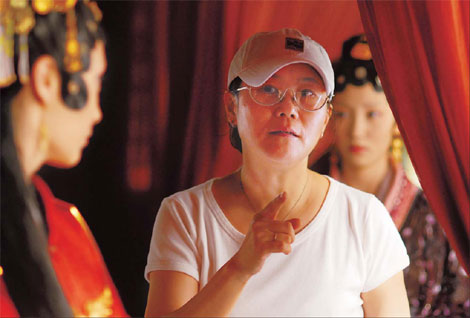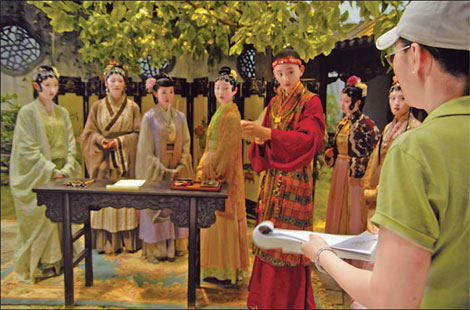Smoke and mirrors
By Liu Wei (China Daily)
Updated: 2010-08-26 09:26
 |
Large Medium Small |
 |
|
Director Li Shaohong talks with two actresses during the shooting of her |
 |
|
Li Shaohong (right) directs the shooting of A Dream of Red Mansions. |
The director of the much-maligned TV adaptation of a Chinese classic says she has tried to capture the essence of the novel and is confident audiences will slowly take to it, Liu Wei reports
In 1964, 9-year-old Li Shaohong wrote on the first page of the Chinese classic, A Dream of Red Mansions: "This is a bad book. Do not read it!" "Everybody wrote that on the book then, so I did it to be politically correct," she says in an exclusive interview with China Daily.
"But I read it anyway, telling myself I was only trying to discover how bad it was."
Those were the early days of the "cultural revolution" (1966-76) and the 18th-century novel was seen as epitomizing the worst of imperial times.
Today, it is hailed as a gem of Chinese classical literature, for its vivid characterizations and sharp observations of feudal society.
Li never expected that decades later she would be embroiled in a major controversy over the book.
Her TV adaptation of the classic, done over three years, has attracted a storm of bad press after recent screenings on some local TV stations and websites.
It has been slammed as a horror flick, because of its eerie music, uneven pacing of sequences and grave voiceover.
Defending herself, Li says she has tried to capture the essence of the book, which is that it is a dream.
"I don't see it (her approach) as a bold idea, because this is what I see the book as. It is a dream," she says.
Li explains that the author, Cao Xueqin, was an 18th-century aristocrat who witnessed his family's dramatic fall. Dreaming is a frequent theme in the book. It is in a dream of the protagonist Jia Baoyu that the fate of the 12 heroines is anticipated. The very title of the book is suggestive of the story's nature.
Li says she has used technology to create the show's dream-like quality.
"I feel like I have made 25 films rather than 50 episodes of a TV series," she says. "Its fantasy feel was not just a matter of using some smoke or diffusion filters. It has been created by the control of color, sound and camera movement, among other techniques."
For example, for TV episodes, both the foreground and background are traditionally kept in focus. While this makes the scenes look real, it does not fit the nature of Li's version.
"As a famous saying in the book goes, 'when falsehood stands for truth, truth likewise becomes false; when naught be made to aught, aught changes into naught,'" Li says.
"You may find the setting false - what place in the world could look as fantastic? But you tend to believe it may exist somewhere. This ambiguous feel is what I wanted to create."
Audiences used to the realistic approach of earlier adaptations - partly because China was not as open as she is today to allow a supernatural tone in a TV series - may not be ready for such a surreal show. But Li believes it is only a matter of time.
"I think people will accept the version gradually, and that is to Cao's merit," she says. "But if they don't, I alone bear the blame."
Red Mansions, which will be shown on TV stations across the country on Sept 2, is not Li's boldest project.
All her works bear her strong personal print and break new ground, such as the costume drama Palace of Desire, which features Shakespearean lines and lavish sets rarely seen on TV, the visually over-the-top Baober in Love, and the shocking thriller The Door. Most of them have brought her plaudits and helped forge her reputation as a keenly sensitive director.
"The Red Mansions is a much-beloved work. People claim it as their own. How can I satisfy every one?" Li wonders aloud.
Even if her adaptation fails to work, it would not detract from the worth of the original, she says.
"I have not destroyed the book, it is still there," she says. "It is a public treasure and that means everybody has the right to interpret it (in his or her own way)."
She remains unfazed by most criticisms, except those that cast doubt on her sincerity.
"You may not like it, but we worked very hard. It's a sincere and serious work."
When she decided to take up the project in August 2007, she had only eight months to prepare the script, cast 300 actors, and get the costumes and set designs of 10 sound stages ready.
Even so, she spent 47 days reading the book aloud word by word, pausing at anything unclear to consult with the four Redologists (people dedicated to the singular study of the Red Mansions) she invited.
The Red Mansions is like an encyclopedia on the habits, food, costumes and customs of 18th-century China. To present a convincing banquet scene, Li had the best southern cuisine chef in town make the dishes exactly as the book describes them.
Tim Yip, Academy Award-winning costume designer of Crouching Tiger, Hidden Dragon, designed 400 of the 3,000 costumes, most of which were hand-made by veteran embroiderers.
During the shooting, Li's husband and also the show's assistant director Zeng Nianping, was diagnosed with a brain tumor. Doctors urged him to go for further examinations, but he did not want to abandon the project and insisted on postponing his hospital visit until the show had been wrapped up.
"This is the most exhausting project I've done, and the one with the most regrets," Li says. "But it is still worthwhile. No director can say no to Red Mansions. For me, to complete it is a big success."
Li says she has matured as a filmmaker with the shooting of the TV series.
The book, she says, has become a part of her. She turns to it every time she encounters a problem.
"Cao Xueqin makes it very clear at the opening of his book that if you like it, it is (like an) apothegm; if not, it is (like) absurd talk that you can just ignore.
"This works for me."
But despite all the mental and physical effort she has put into Red Mansions, the thought of taking up something lighter next has never crossed her mind.
Whatever she does needs to be exciting.
"(Maybe) The Plum in the Golden Vase," she ventures, referring to the work of fiction best known for its graphic sex scenes.
"Just kidding!" she adds quickly. "But seriously, it should be something more challenging than the Red Mansions."